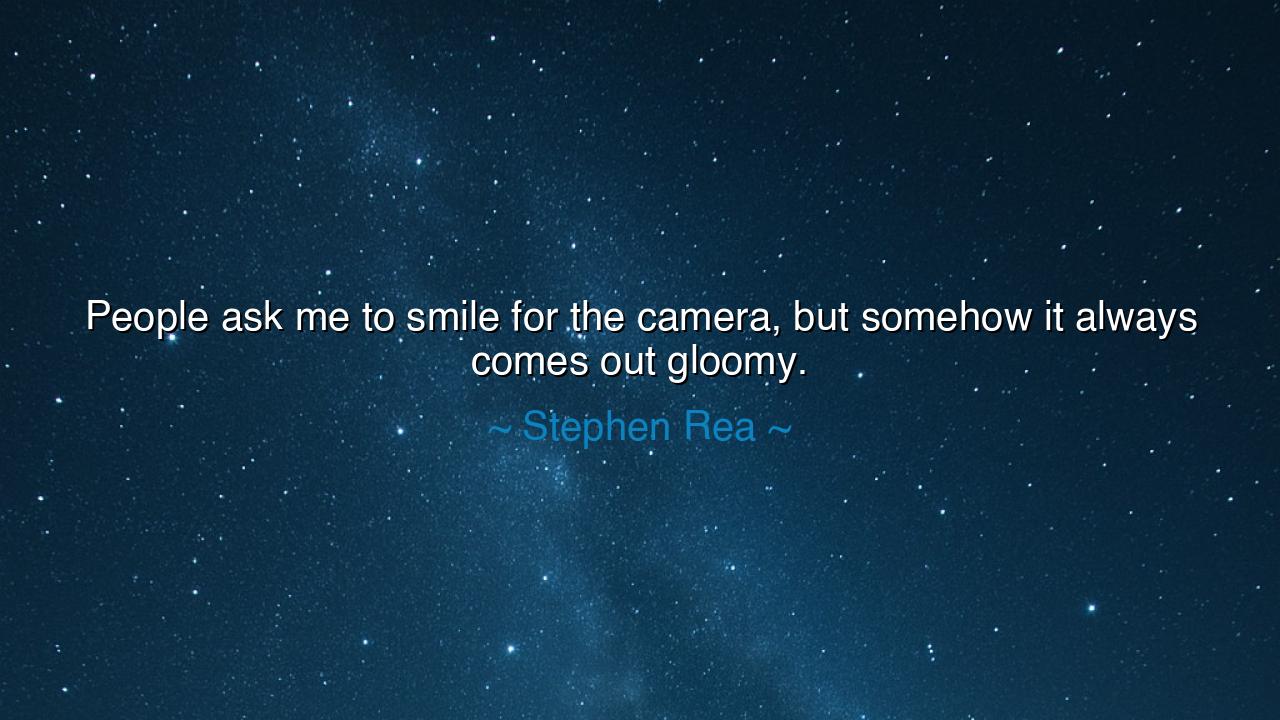
People ask me to smile for the camera, but somehow it always






Stephen Rea once said with quiet honesty: “People ask me to smile for the camera, but somehow it always comes out gloomy.” At first, these words may seem like nothing more than a confession of shyness or a peculiar quirk. Yet, when pondered deeply, they reveal the profound tension between outward expectation and inward truth. For the world often demands brightness from us, demands a mask of cheerfulness, yet the soul cannot always bend to such requests. The smile that is forced without joy becomes shadowed, carrying with it the weight of what lies within.
The ancients knew this truth well. They taught that the face is the mirror of the soul, and no matter how carefully one disguises it, the eyes and the mouth betray the inner state. A forced smile can stretch across the lips, but if sorrow dwells in the heart, it leaks through, transforming what was meant to be bright into something pensive, even gloomy. Rea’s words echo this timeless wisdom: that authenticity cannot be commanded, and the soul speaks even when the body tries to hide it.
Consider the life of Abraham Lincoln, often remembered as a man of humor and wit, yet whose portraits nearly always bear a grave and somber look. Though he could tell stories and offer laughter to others, when faced with the stillness of the camera, his face revealed the weight of the Civil War, the grief of personal loss, and the crushing burden of leadership. His “smiles” often appeared heavy, much like Rea’s, because the inner sorrow could not be erased by outward command. Thus, the image recorded was not cheerful illusion, but the truth of a soul carrying the fate of a nation.
Rea’s words also speak to the deeper human struggle between appearance and essence. The world craves easy cheer—smiling faces on magazines, joyful images on screens, the illusion that life is light and effortless. Yet many souls, marked by hardship or reflection, cannot conjure joy on demand. Their smiles carry the shadows of their journeys. And while the world may see this as gloom, in truth it is honesty, the refusal to pretend when the heart does not permit it.
There is also dignity in such gloom. For it is better to let one’s smile bear the marks of authenticity than to fashion a mask that deceives both others and the self. A gloomy smile is still a smile—it is the smile of endurance, of one who continues forward despite heaviness. It is a reminder that joy and sorrow often mingle, that life is not pure sunlight nor pure shadow, but a tapestry where both are interwoven. In this sense, Rea’s gloom is not weakness, but a subtle form of strength.
The lesson here is clear: we must not demand false smiles from ourselves or from others. Instead, we must learn to honor the truth that appears on the face, whether bright or shadowed. When your smile emerges, let it be real, even if it carries sorrow. And when others present to you a gloomy smile, do not scorn it—see it as a window into their soul, a testimony of what they have endured. For authenticity is more precious than performance, and a single honest smile, however heavy, carries more power than a thousand empty ones.
So, my children, take these words of Stephen Rea to heart. Do not chase the hollow brightness the world demands, but embrace the truth of your own expression. If joy is within you, let it shine; if sorrow lingers, let it show. For the camera may ask for light, but history honors truth. And in the end, even a gloomy smile has its beauty—for it is the sign of a soul that refuses to lie, a soul that has lived, suffered, and still dares to face the world.






AAdministratorAdministrator
Welcome, honored guests. Please leave a comment, we will respond soon